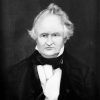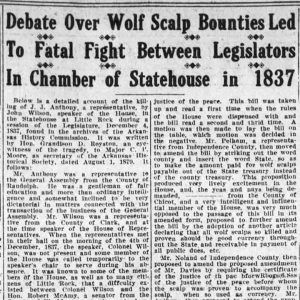calsfoundation@cals.org
Joseph J. Anthony (1780?–1837)
Joseph J. Anthony, a soldier, politician, and Arkansas pioneer, fell victim to one of the most extraordinary and bizarre events in Arkansas political history. He became the only sitting member of the state legislature to be killed during a debate in the Arkansas House of Representatives.
J. J. Anthony, born possibly as early as 1780, was a native of Virginia and the son of the Reverend Joseph Anthony, a Baptist minister, and his wife, Jane Ferris. The family moved to central Tennessee shortly after 1800, and, by 1808, Anthony was living in Smith County. On the eve of the War of 1812, he was appointed a second lieutenant in the Twenty-fourth United States Infantry. After the outbreak of hostilities, he commanded a company of Tennessee troops at Fort Stephenson on Lake Erie, where he rose to the rank of first lieutenant in 1813. On August 1–2, 1813, he participated in the American defense against a British attack on nearby Fort Sandusky.
Shortly afterward, he was arrested on charges of cowardice and dereliction of duty, charges he vigorously denied. However, in order to avoid a court martial, he resigned his commission. He then enlisted as an assistant adjutant general under Andrew Jackson and served with distinction against the Creek Indians in Alabama. This service gained him the lifelong designation of major.
At war’s end, Anthony returned to Tennessee, where he became a farmer and businessman in Smith County. By 1830, he was living in Madison County, Missouri. In 1835, he moved to Arkansas Territory, where he became a landowner in the soon-to-be-created Randolph County.
Anthony’s physical appearance was impressive. One contemporary wrote that he was “a very large and powerfully built man, over six feet tall, weighing 200 pounds.” His stature, his “fair education and more than ordinary intelligence,” and familiarity with the law made him a natural choice for public office. In 1836, he was elected to represent part of Randolph County in the lower house of the Arkansas General Assembly. However, his tenure was not without controversy. In 1836, an anonymous letter published in the Arkansas Advocate in Little Rock (Pulaski County) attacked him as a tool of the Chester Ashley and William E. Woodruff political faction. His past also continued to haunt him even on the western wilderness. His short military career was held up to public ridicule.
On December 4, 1837, John Wilson, speaker of the Arkansas House and newly elected president of the Arkansas Real Estate Bank, took exception to remarks made by Anthony, who was known to be “somewhat inclined to be very dictatorial in matters connected with the transacting of [legislative] business.” The issue was an amendment to a bill for paying bounties for wolf scalps. Anthony proposed that, instead of requiring the bounty seeker to obtain the usual certification before a local justice of the peace, that the certificate be signed before the “President of the Real Estate Bank.” Wilson, who happened to be the president of the bank, perceived Anthony’s remarks, which were in jest, as a personal insult. He swiftly left the speaker’s chair, drew his bowie knife, and advanced upon Anthony, who promptly drew his own knife and tried in vain to defend himself. In a fury, Wilson stabbed him, and Anthony fell dead, pierced through the heart. Although indicted for murder, Wilson was found not guilty by a jury in Saline County after a change of venue.
Anthony was buried in Little Rock’s old “public grave-yard,” located where the Little Rock Federal Building now stands on Capitol Avenue. There is good reason to believe that his remains still reside somewhere at the site since his name is not among those listed as being removed to Mount Holly Cemetery in 1860. Anthony never married and left no immediate heirs.
For additional information:
Baker, Russell P. “Arkansas’s Major Joseph J. Anthony.” Pulaski County Historical Review 46 (Winter 1998): 74–78.
Featherstonhaugh, George W. Excursion through the Slave States from Washington on the Potomac to the Frontier of Mexico; with Sketches of Popular Manners and Geological Notices. New York: Negro Universities Press, 1968.
Grandison, Royston D. “A Scrap of History: The Killing of J. J. Anthony.” Arkansas Gazette. June 4, 1882, p. 5.
Russell P. Baker
Arkansas History Commission
 Anthony, Joseph J. (Murder of)
Anthony, Joseph J. (Murder of) Louisiana Purchase through Early Statehood, 1803 through 1860
Louisiana Purchase through Early Statehood, 1803 through 1860 Fighting Legislators Article
Fighting Legislators Article 



Comments
No comments on this entry yet.